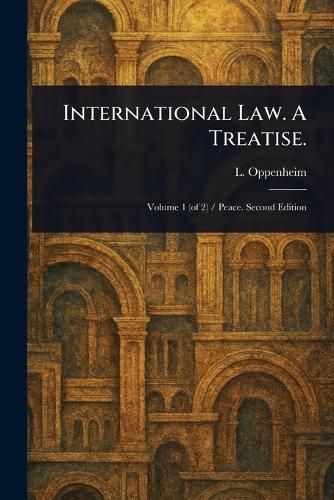Readings Newsletter
Become a Readings Member to make your shopping experience even easier.
Sign in or sign up for free!
You’re not far away from qualifying for FREE standard shipping within Australia
You’ve qualified for FREE standard shipping within Australia
The cart is loading…






This title is printed to order. This book may have been self-published. If so, we cannot guarantee the quality of the content. In the main most books will have gone through the editing process however some may not. We therefore suggest that you be aware of this before ordering this book. If in doubt check either the author or publisher’s details as we are unable to accept any returns unless they are faulty. Please contact us if you have any questions.
Explore the foundational principles of international law in "International Law. A Treatise. Volume I (of 2): Peace. Second Edition" by Lassa Francis Oppenheim. This meticulously prepared print edition offers a deep dive into the complexities of international relations, focusing specifically on the laws governing peace.
Delve into the historical context of treaties, sovereignty, and jurisdiction as they relate to international law. Oppenheim's treatise provides a comprehensive overview of the legal frameworks designed to maintain peace and manage the relationships between nations.
This volume explores key aspects of international law relevant to both political science and history. Examine the legal considerations surrounding war and the ongoing efforts to establish a stable and just international order. A valuable resource for anyone interested in the historical development of international law and its enduring relevance in the modern world.
This work has been selected by scholars as being culturally important, and is part of the knowledge base of civilization as we know it.
This work is in the public domain in the United States of America, and possibly other nations. Within the United States, you may freely copy and distribute this work, as no entity (individual or corporate) has a copyright on the body of the work.
Scholars believe, and we concur, that this work is important enough to be preserved, reproduced, and made generally available to the public. We appreciate your support of the preservation process, and thank you for being an important part of keeping this knowledge alive and relevant.
$9.00 standard shipping within Australia
FREE standard shipping within Australia for orders over $100.00
Express & International shipping calculated at checkout
This title is printed to order. This book may have been self-published. If so, we cannot guarantee the quality of the content. In the main most books will have gone through the editing process however some may not. We therefore suggest that you be aware of this before ordering this book. If in doubt check either the author or publisher’s details as we are unable to accept any returns unless they are faulty. Please contact us if you have any questions.
Explore the foundational principles of international law in "International Law. A Treatise. Volume I (of 2): Peace. Second Edition" by Lassa Francis Oppenheim. This meticulously prepared print edition offers a deep dive into the complexities of international relations, focusing specifically on the laws governing peace.
Delve into the historical context of treaties, sovereignty, and jurisdiction as they relate to international law. Oppenheim's treatise provides a comprehensive overview of the legal frameworks designed to maintain peace and manage the relationships between nations.
This volume explores key aspects of international law relevant to both political science and history. Examine the legal considerations surrounding war and the ongoing efforts to establish a stable and just international order. A valuable resource for anyone interested in the historical development of international law and its enduring relevance in the modern world.
This work has been selected by scholars as being culturally important, and is part of the knowledge base of civilization as we know it.
This work is in the public domain in the United States of America, and possibly other nations. Within the United States, you may freely copy and distribute this work, as no entity (individual or corporate) has a copyright on the body of the work.
Scholars believe, and we concur, that this work is important enough to be preserved, reproduced, and made generally available to the public. We appreciate your support of the preservation process, and thank you for being an important part of keeping this knowledge alive and relevant.